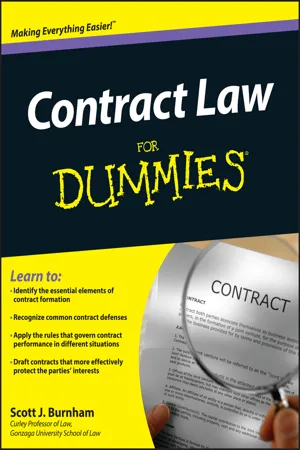Part I
Introducing Contract Law and Contract Formation
In this part . . .
Chapter 1 begins by exploring the fundamentals of contract law — what it is, how it came into being, and which sources provide the rules and principles that govern contracts. Here, you discover the basics of contract formation, contract defenses, and contract interpretation, and you find out what generally happens when parties don’t fulfill their contractual obligations.
The remaining chapters in this part focus on contract formation. You encounter the three essential elements of contract formation — offer, acceptance, and consideration — and find out when promises are enforceable even if parties haven’t met the requirements to form a contract.
Chapter 1
Getting the Lowdown on Contract Law
In This Chapter
Wrapping your brain around the concept of contract law
Grasping the fundamental rules and principles that govern contracts
Understanding contract formation, defenses, and interpretation
Getting up to speed on performance, breach, and remedies
Contract law may feel overwhelming, especially when you’re in a class that reads and analyzes case after case after case. Adding to that load are the many sources of contract law, including the common law, the Restatement of Contracts (Restatement), the Uniform Commercial Code (UCC), federal and state statutes, and rules that govern when parties are allowed or prohibited from coming up with their own contract terms.
Although all the details swirling around the topic of contract law are important, placing those details in context makes them more manageable and enables you to see the big picture. That’s what this chapter is all about. Here, you get the eye-in-the-sky view of contract law and a framework on which to hang the rich tapestry of policies, principles, and rules collectively referred to as contract law.
Grasping the Concept of Contract Law
Contrary to popular belief, contract law isn’t just a bunch of rules and regulations that govern agreements between people. It’s not developed and imposed from above by some rule-making authority. It developed naturally over the course of thousands of years through the interactions and transactions between people like you and me — the parties who form contracts.
In this section, I explain what a contract is, present a few different perspectives on the principles that should drive the formation of contract rules, and briefly explore how contract law developed into what it is today.
Defining contract
A contract is simply a promise or set of promises enforceable by law. Which agreements are enforceable by law varies from culture to culture — what’s acceptable in one culture may not be acceptable in another. If I agree to sell you my house, for example, the house-selling culture says that I can’t make any untruthful statements about the house. But if I agree to play a hand in the World Series of Poker, then the poker culture says that I can’t make any truthful statements about my hand.
The United States doesn’t have a monolithic contract law with uniform rules. Contract law is nuanced and fact intensive. A “rule” may differ, for example, depending on whether the parties are two giant corporations having their lawyers negotiate an agreement or family members making an agreement over the dinner table.
Comparing different schools of thought on contract rules
The overriding principles that guide the formation of contract rules vary according to different schools of thought. Depending on your perspective, you may think that the rules should be based on what is
Customary and reasonable: In most systems of contract law, the rule that develops is usually based on what’s customary and reasonable. With nearly every issue that arises in contract law, just think about what’s reasonable, and you’ll usually discover the “rule.”
Economically efficient: My economist friends think that rules should be based on what’s most economically efficient. According to the economists, people enter contracts for their mutual financial benefit; for example, you agree to sell and I agree to buy your car for $7,000, because right now, the $7,000 is worth more to you than the car, and the car is worth more to me than the $7,000 I have in my piggy bank. Throughout this book, I sometimes share the economist’s perspective, but if you haven’t studied Econ (or read
Economics For Dummies [Wiley]), stick with asking what’s reasonable and you’ll come up with the rule most of the time.
Fair for the little guy: According to my friends in the Critical Studies movement, the people in power, who happened to be rich white men, made the rules. The rich guys came up with rules that are favorable to them, so contract law needs to watch out for the little guy, who gets the worst of it in contracts.
Regardless of view, everyone would probably agree that one of the most difficult problems facing contract law today is the ease with which consumers can bind themselves to contracts by clicking I AGREE to the “terms and conditions” that nobody reads. This is quite different from the contract created by a carefully negotiated exchange of drafts. Or is it? Throughout your career in contract law, you’ll struggle to determine whether the same rules apply to both situations.
Tracing contract law’s roots
Most contract law in the United States comes from England, where it was largely based on the tradition commonly referred to as the common law, meaning the law made by judges. Many of the rules of commercial law that govern buying, selling, and financing come from medieval times. Anytime parties traded, they had to have an understanding of the deal they were making. They made their own rules, called the law merchant, to govern their situation.
As the law became more specialized, various areas of contract law were spun off and now stand on their own. Insurance law, banking law, and government procurement law are all areas of contract law that you don’t study in a standard Contracts course. One authority has called contract law “the law of leftovers” — general principles that remain irrespective of the substance of the transaction.
Meeting the Key Players: Common Law, the Restatement, and the UCC
Although you’ll find no definitive collection of the rules and regulations that govern contracts, you can find guidance from three primary resources: the common law, the Restatement of Contracts, and the Uniform Commercial Code (UCC, or the Code). I refer to these resources throughout the book, so you need to h...














